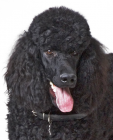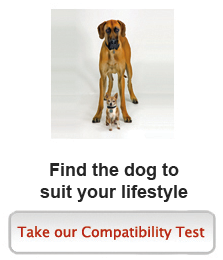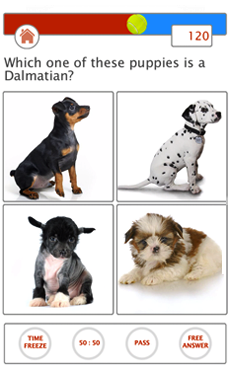Poodle Standard
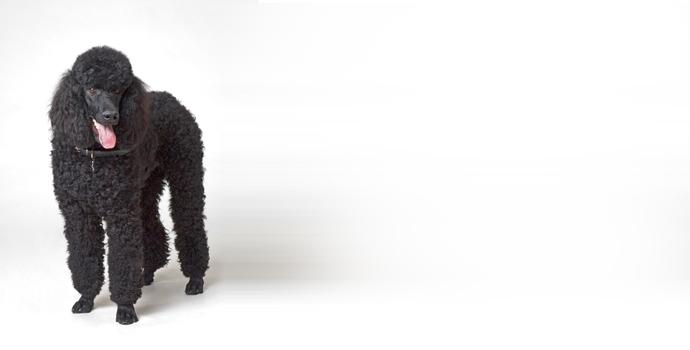
In my own words
Hey, can you see that? I’m pretty sure I just spotted a lake over there. Let’s go and check it out! Then I can jump straight in and have a really good swim. Didn’t you hear? I’m a fantastic swimmer. In fact, my breed name is descended from the German word ‘Pudel’ which means ‘to splash in water’. That’s pretty apt, huh? I do love to splish and splash in any water I can find. It’s just the most fun, ever!
Once, we’re done with paddling and swimming, we can go home and I’ll play with the kids. I get on so well with those little humans; they’re great fun and always think of brilliant games to play! I particularly love it when they teach me new tricks too. Did you know I can play dead and dance now? After water, learning tricks is one of my favourite things to do. Maybe one day we could take part in a competition? I bet I’d win!
My ideal owner(s)
Single people
People who have active lifestyles
Families
Both country and city folk
People who enjoy long walks
What they say about me
Friendly and sociable
Great swimmer
Affectionate
Intelligent
Easy to train
Please read on to find out more about me, and whether I’ll be someone you’ll be happy to live with for the next 14 years!
Is this Poodle for you?
Test your knowledge about the Poodle
Information essential about the Poodle Standard
Kennel Club Group:
Utility
Size:
Large: Weight Male 45 – 75 lb (20.5 – 32 kg) Female 45 – 75 lb (20.5 – 32 kg)
Height Male 15 – 24” (38 – 61 cm) Female 15 – 24” (38 – 61 cm)
Popularity:
The Standard Poodle is one of the world’s most popular breeds of dog. This is due to its adaptability as both a family pet and a working dog. The fact that the breed does not shed also makes them very popular among owners who have allergies or simply want a dog which does not leave hair all over the home. In addition, their intelligence and willingness to be trained makes them fantastic family pets and a wonderful breed for first time dog owners
Breed History:
While the exact origins of the poodle are unknown, many breed historians agree that the breed most likely originated from Germany, though it also has a long history in Russia and France.
The breed has been prevalent in Europe for many centuries, with paintings from as far back as the 1400s depicting the poodle. The standard poodle was the first variety of poodle, with the miniature and toy poodles bred later.
The name poodle most likely originates from the German word ‘pudel’ which means ‘to splash in water’. It has been suggested that German troops took poodles to France during the 1400s, and they became a very popular dog in France from then on. This may explain why some people refer to the poodle as the French Poodle.
The Poodle was bred to be a hunting dog and retriever of ducks, which is why the breed enjoys swimming so much. As well as being excellent at hunting waterfowl, the Poodle was prized for its intelligence and well-mannered, friendly nature.
The poodle’s ability to pick up new tricks meant that they soon became used as circus dogs and, later, were a common sight in the show ring
Character:
Your Poodle is an incredibly friendly dog who loves to please his owners and is wonderfully affectionate towards everyone. Poodles have a an extroverted side which means they love to show off and will frequently try to entertain their human family – they are a humorous breed when they want to be and love to make their owners happy. Your Poodle’s playful character means he loves to get your attention and is a very sociable dog. Poodles thrive on company and will want to be completely involved in all parts of family life. A wonderful family dog, your Poodle is fantastic with older children as he is not only fun loving but also patient and gentle. If properly socialised, your Poodle will also do well with younger children although his size makes him a better pet for those that are a bit older.
Temperament:
As well as being a polite and calm dog, the Poodle is also a high energy breed. He’s lively and spirited and therefore needs plenty of exercise to keep him a content and well-balanced dog. Your Poodle will thrive with plenty of daily exercise and he loves to swim; he was bred to be an excellent swimmer and as such he adores jumping into water whenever possible! The Poodle is best suited to an active and busy lifestyle and may become destructive if he isn’t given enough mental and physical stimulation. The Poodle is one of the easiest dogs to train because he is incredibly sensitive to the tone and pitch of your voice. It is therefore important not to raise your voice or speak to him harshly, or your Poodle may become upset and training will become more difficult. Although your Poodle is generally a sociable and friendly dog, he can make a good watch dog as he will usually announce visitors with a few barks.
Conformation:
The Poodle has an elegant and poised stature with a medium sized frame. The body should be squarely built and well proportioned, with long legs which attribute to a bouncy, trot-like walk. The head should be long with a rounded skull and long muzzle. There should be a slightly chiselled look under the eyes, which are wide, dark and oval shaped. The teeth meet in a scissor bite. The ears should be set low and hang close to the head. A strong, long neck meets muscular shoulders, while the ribs are well sprung and the chest is deep. The forelegs are straight and the hindquarters are very muscular, which gives the poodle power when hunting and swimming. The feet should be small and oval, with close toes and tough, hard pads. The Poodle’s tail should be set high. A medium to long length coat is curly and profuse and is trimmed in a variety of styles, including the pet clip which is completely short, the continental clip in which the hindquarters, half the tail and the upper legs are shaved, and the English saddle clip in which only half the tail and the upper legs are clipped.
Colour:
The Poodle’s coat can come in any solid colour, but the most common shades are black, white, blue, grey, silver, brown, café-au-lait, apricot and cream. In all but the white dogs, the coat colour will begin to fade at the age of four or five years.
Training:
The Standard Poodle is famous for its intelligence and is a wonderfully easy dog to train, making them excellent at obedience work and agility competitions. Their ability to pick up new tricks once made them popular circus dogs. They are incredibly sensitive to vocal tone and pitch, which can help in training but can also be a hindrance if you speak too loudly, harshly and severely. Be sure to use calm but firm vocal commands and use reward based training to get the most from your Standard Poodle
Care:
The Standard Poodle does not shed and is therefore a good breed for people who have allergies. However, they do need a substantial amount of grooming. Poodles need to be clipped on a regular basis and, as they do not shed and dirt and odour can build up in their coats, they also need bathing frequently. Their curly coats also need a daily brush in order to stop the coat from becoming tangled. The distinctive cuts of the Poodle coat were originally created to make the dogs lighter and better suited to swimming while hunting and retrieving ducks, while protecting their joints and vital organs when it was cold. However, the continental and English saddle clips are now more commonly seen in the show ring, while most dogs used as pets are kept in a puppy or pet clip. Whichever clip you choose, you must be prepared to take your Poodle to the groomer approximately every six weeks for a clip. It is also important to keep your Poodle’s teeth and ears clean in order to avoid ear infections and gingivitis.
Health:
Though the Standard Poodle is a relatively hardy breed, there are a few health problems to look out for. All Poodles are prone to eye problems, including Progressive Retinal Atrophy, Cataracts and Glaucoma. Epilepsy is also an issue for Standard Poodles, as is hip dysplasia which is common in larger breeds of dog. Your standard poodle is also susceptible to bloat, during which the stomach can turn and become blocked, causing a build-up of gas. Bloat can be fatal, so avoid it by feeding your Poodle smaller meals more often, rather than fewer but larger meals. The average lifespan of the Standard Poodle is 10 – 14 years.
You may also like:
Poodle Standards looking for a home in UK »

If you like Poodle Standards, you may be interested in breeds of the same size »

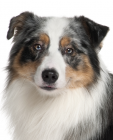
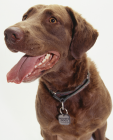
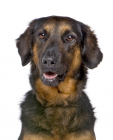

If you like Poodle Standards, you may like other breeds with similar characteristics »
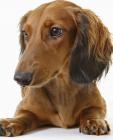
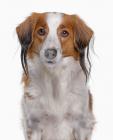

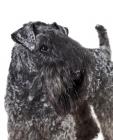
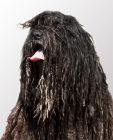
If you like Poodle Standards, you may be interested in these other utility dogs »
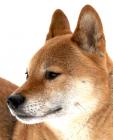


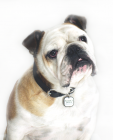
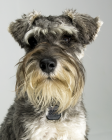
Advice on choosing your breed »
Find an animal shelter or rescue home where a Poodle Standard is waiting for a new home »
The following grid gives a fast track review which covers all breeds. You can apply it to help you decide if a Standard Poodle is suitable for you, the environment where you live, your personality and your lifestyle. On the grid, 1 = strongly disagree, and 5 = strongly agree. For example, if you are looking for a dog that is suitable for someone with allergies, look down the list under ‘grooming’ and you will see that Standard Poodles are very hypoallergenic, scoring 5. If you are looking for a dog that doesn’t shed much, look under the same heading and you’ll see a Standard Poodle would be an excellent choice, scoring 1 under ‘moults a lot’. You might like to save or print off this section and keep it for reference while you check some other breeds before making your choice.
Be the first to rate this breed »
|
*PLEASE NOTE: All our breed profiles are general, and all dogs are individuals. Always talk to the breeders and meet the owners you are buying from. Try to meet the dog and its parents if it is a puppy in their home environment.








